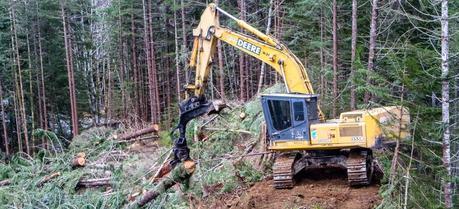 (Credit: Flickr @ hans peter meyer https://www.flickr.com/photos/hanspetermeyer/)
(Credit: Flickr @ hans peter meyer https://www.flickr.com/photos/hanspetermeyer/)The levels of forest residue bioenergy, considered to be sustainable from a forestry perspective, may provide considerable reductions in greenhouse gas emissions in European countries. Still, these reductions fall short of a 60 % threshold planned by the EU. This mismatch may have important climate policy implications.
The EU is planning to extend its specific sustainability criteria based on greenhouse gas emissions for biofuels to renewable energy produced from solid biomass. These criteria are foreseen to require a 60% reduction in greenhouse gas emissions compared to an alternative fossil fuel.
A new study estimated emission reductions achievable in European countries by producing bioenergy from forest harvest residues in amounts that have been considered to be sustainable from a forestry perspective earlier. These forestry sustainability criteria included several environmental, technical and social aspects.
According to the study, forest residue bioenergy must be used for 60 to 80 years before the emission savings reach the required 60 % level in most European countries. This lag follows from the effect of the harvest residue removals on the carbon balance of forests especially soil (indirect land-use-related emissions). Nevertheless, the residues provide substantial emission reductions already sooner. By 2035, the emissions are reduced by 25 to 55 % if the residues are used to produce heat and 0 to 30 % if they used to generate electricity; the figures vary between countries.
The gap between the emission reductions and the EU requirement may have important implications. On one hand, the gap may decrease interest in this considerable source of renewable energy in many European countries. On the other hand, the gap may encourage the development of incomplete accounting rules of the emissions. Such rules would lead astray and reduce the interest in developing genuine low-emission climate-friendly practices of bioenergy production from forest residues.
Repo, A., Böttcher, H., Kindermann, G., & Liski, J. (2014). Sustainability of forest bioenergy in Europe: land-use-related carbon dioxide emissions of forest harvest residues GCB Bioenergy DOI: 10.1111/gcbb.12179
